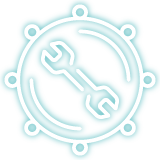PUBLICATION DETAILS
IkappaB kinase epsilon (IKK(epsilon)) regulates the balance between type I and type II interferon responses.
Ng, S. L., Friedman, B. A., Schmid, S., Gertz, J., Myers, R. M., Tenoever, B. R. and Maniatis, T.
Proc Natl Acad Sci U S A 16/12/2011
PMID: 22171011
Abstract
Virus infection induces the production of type I and type II interferons (IFN-I and IFN-II), cytokines that mediate the antiviral response. IFN-I (IFN-alpha and IFN-beta) induces the assembly of IFN-stimulated gene factor 3 (ISGF3), a multimeric transcriptional activation complex composed of STAT1, STAT2, and IFN regulatory factor 9. IFN-II (IFN-gamma) induces the homodimerization of STAT1 to form the gamma-activated factor (GAF) complex. ISGF3 and GAF bind specifically to unique regulatory DNA sequences located upstream of IFN-I- and IFN-II-inducible genes, respectively, and activate the expression of distinct sets of antiviral genes. The balance between type I and type II IFN pathways plays a critical role in orchestrating the innate and adaptive immune systems. Here, we show that the phosphorylation of STAT1 by IkappaB kinase epsilon (IKKepsilon) inhibits STAT1 homodimerization, and thus assembly of GAF, but does not disrupt ISGF3 formation. Therefore, virus and/or IFN-I activation of IKKepsilon suppresses GAF-dependent transcription and promotes ISGF3-dependent transcription. In the absence of IKKepsilon, GAF-dependent transcription is enhanced at the expense of ISGF3-mediated transcription, rendering cells less resistant to infection. We conclude that IKKepsilon plays a critical role in regulating the balance between the IFN-I and IFN-II signaling pathways.
